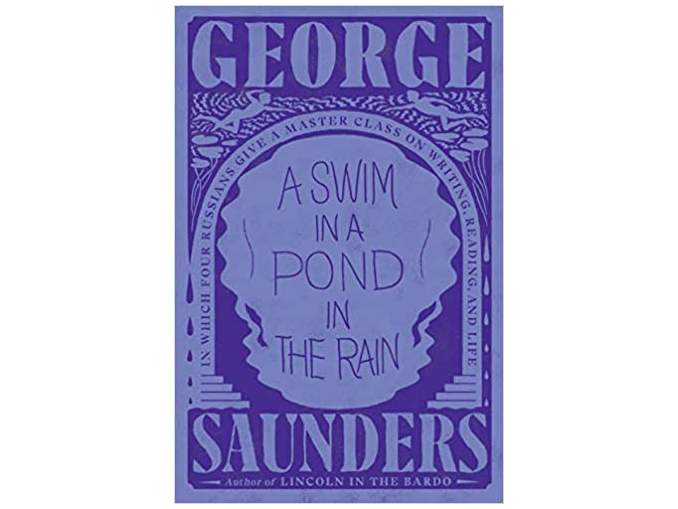by George Saunders, Bloomsbury Publishing PLC, 2021
Prize-winning author George Saunders, whom you may know via Lincoln in the Bardo, has a day job other than writing. A professor of twenty years, he’s been lecturing in the highly-regarded graduate MFA writing program at Syracuse University, where he analyzes Russian short stories for insights into ways to improve his students’ written work.
Wow! That was a long sentence; George would give me a low C for that one!
In A Swim in a Pond in the Rain (intriguing title, huh?), he uses the structure of his course to take apart seven short stories from four nineteenth-century Russian masters—Chekhov, Turgenev, Tolstoy, and Gogol. Now, this is not dry stuff. His enthusiasm and conversational style really make you feel you’re sitting in an intimate lecture theatre with a few other lucky students. In fact, he is so engaging that even those who want to hide at the back are soon charmed to draw their chairs nearer to the front.
While this book is intended to be about writing, to my mind it is primarily a book about reading. The act of reading and how that process informs your writing is Saunders’ shtick. If you are mindful in your reading and not simply scanning pages, then you will be rewarded by how insightful your reading already is, what you notice, what you question, and how you feel as a story unfolds.
I found this to be the true value of the book. For me, the best reading has always been about immersion. It doesn’t matter if it is fact or fiction. It’s about how the words transport you and totally capture your imagination, shutting out all distractions. If a book doesn’t have this effect, then I have no qualms about binning it and starting another. Life is, after all, short, as these Russian stories often make plain.
When asked to write this book review, I was reminded that it is for a business audience of qualitative researchers. Despite some trepidation about my choice of book, I found A Swim in a Pond in the Rain to be highly relevant. Saunders’ approach is one of investigation. The book is split into sections; each starts with a short story and is followed by his process of inquiry. “What do you feel?” he asks. “What have you learnt?”, “What do you want to do now you’ve been introduced to the story’s characters?” He asks, “How did these characters get here? What are their backgrounds? What do you think about their motivation? How do you feel about them? Do you care about them?”
This is transactional stuff. It is not simply the time spent reading that you are investing, but your emotional involvement too. “A story is a frank, intimate conversation between equals,” or, I thought, at least it should be. We’ve all read novels where we are aware of the complexity of the language. That kind of showboating can get in the way of the action. If you are watching a suspenseful movie, you don’t want to drift into thinking about how beautifully it is shot; that too would be a distraction. When my 17-year-old daughter took me to see the Neil Armstrong movie First Man, I asked afterward why she had chosen it. “For the music, Dad!” I should have realized; she is studying music and wants to become a film composer. But for me, it was simply a terrific movie, and I hadn’t noticed the music. When I re-watched the film, I understood just how much the score contributed. Duly noted, daughter.
Saunders goes on to look at structure. “Stories are made up of limited elements that we relate against each other.” It’s like looking at objects on a table in a still life painting. If we remove an item, what is the effect on the composition? What about adding something? Why do we need characters in stories? Why, for that matter, do we need a plot?
Those last two questions had me really guessing.
Throughout all of this, Saunders, secular to his head hair, offers no practical advice apart from this parting shot. “Go forth and do as you please,” he says. It’s as close to a manifesto for creative writing as you can get, and not a bad tenet for life in general.
“The world is full of people with agendas, trying to persuade us to act on their behalf. But inside us is what Hemingway called a ‘built-in shit detector.’ We detect it by the way the deep, honest part of our mind reacts to it.”
—An excerpt from A Swim in a Pond in the Rain





Be the first to comment